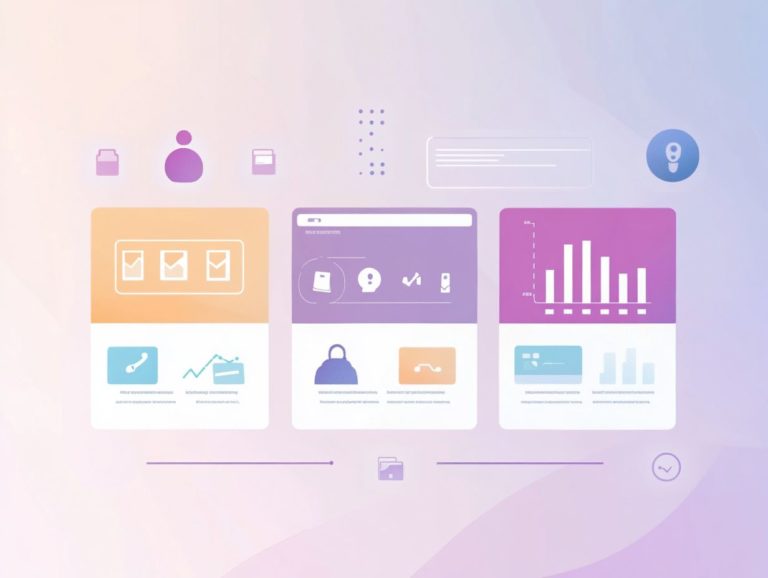What is Contact Management in CRM Software?
Effective contact management is essential for Customer Relationship Management (CRM) software. It forms the backbone of successful business interactions.
This article explores contact management features like database organization, communication tracking, and lead management. These features streamline processes and enhance customer relationships.
By optimizing contact management, you can drive growth and build lasting connections with clients.
Contents
Key Takeaways:

Contact management is vital for organizing and tracking customer interactions. Key features include database organization and communication tracking. Using these tools leads to better customer relationships and efficient sales processes.
Defining Contact Management and its Role in CRM
Contact management is a cornerstone of customer relationship management (CRM) systems. It helps organize and maintain accurate customer information for effective communication.
Quick access to crucial data allows you to respond to inquiries swiftly. This significantly enhances the customer experience.
A robust contact management system tracks interactions over time. It enables teams to anticipate needs and tailor their approaches.
CRM platforms like Salesforce, HubSpot, and Freshworks offer advanced tools for identifying trends. They help create personalized outreach while ensuring customer data security.
Focusing on customer data management streamlines operations and builds trust. This lays a solid foundation for customer loyalty.
Key Features of Contact Management in CRM Software
The key features of contact management provide a set of useful tools for refining customer profiles. They streamline data extraction and boost overall efficiency.
With a central dashboard, you can easily access and manage contact records. You can also use reporting tools for insightful analytics.
These features enhance interactions with customers and improve marketing strategies.
Contact Database Organization
An organized contact database is essential for effective management. It allows systematic storage and retrieval of customer data.
Categorizing customer profiles and using segmentation techniques streamline communication. This makes your marketing efforts more efficient.
Tagging systems help filter contacts based on preferences or buying behavior. This facilitates more personalized interactions.
Regular updates are vital; outdated information can lead to missed opportunities. Keep your database current for maximum efficiency.
A well-structured contact database is more than just information storage. It s a powerful tool for building deeper relationships with customers.
Communication Tracking and Automation
Effective communication tracking is essential for enhancing your interactions with customers. Engage in timely and personalized conversations.
Integrating Customer Relationship Management (CRM) software streamlines your communication workflows. This ensures that every interaction is logged and easily accessible.
You can track customer preferences and behaviors, setting the stage for personalized marketing strategies that resonate with individual needs.
Automating follow-ups and reminders saves your team valuable time, freeing them to build deeper and more meaningful relationships.
Ultimately, these tools foster stronger engagement. Your customers will feel valued at every touchpoint along their journey.
Lead and Sales Management

Lead and sales management functionalities within contact management systems enable you to efficiently generate leads and transform them into satisfied customers.
By leveraging robust CRM platforms, you can streamline your outreach efforts strategically. This ensures that no potential opportunity slips through the cracks.
These systems facilitate lead generation through automated tools and enhance your tracking capabilities. You can monitor each lead s journey from initial contact to final sale.
The significance of maintaining strong customer relationships cannot be overstated. Effective sales strategies often hinge on personalized interactions and attentive follow-ups.
With data-driven insights provided by these platforms, you can refine your approach, maximizing conversion rates and fostering long-lasting client loyalty.
Benefits of Using Contact Management in CRM Software
Leveraging contact management within CRM software presents a wealth of advantages. It fosters improved customer relationships, enhances the agility of your communications, and streamlines sales processes all of which are crucial for business growth and customer satisfaction.
Improved Customer Relationships
Improved customer relationships are a remarkable advantage of effective contact management. This allows you to foster deeper connections through personalized marketing and tailored interactions.
By utilizing CRM tools, you can analyze detailed customer profiles and preferences. This enables you to craft messages and offers that resonate deeply with individual consumers.
This tailored approach enhances the customer experience and cultivates brand loyalty, as clients feel recognized and valued.
When you leverage data analytics, you can segment your audience more effectively. This ensures your marketing efforts align with their specific needs and interests.
As a result, these personalized interactions lead to increased engagement and a more loyal customer base likely to advocate for your brand.
Efficient Sales Processes
Efficient sales processes thrive on robust contact management systems. These systems enable you to access real-time customer data and drive effective lead generation strategies.
By harnessing this essential information, you can tailor your outreach efforts to meet the unique needs of potential customers, ultimately boosting conversion rates.
Modern CRM platforms come equipped with various tools, such as predictive analytics, automated follow-up reminders, and detailed customer segmentation.
These features allow you to identify high-quality leads and prioritize your engagement efforts.
Integrating communication channels within CRM systems enables seamless interaction. This ensures that no valuable touchpoint slips through the cracks.
By enhancing the entire sales workflow, these technologies not only streamline your processes but also foster stronger client relationships, vital for sustaining long-term business growth.
How to Implement Contact Management in CRM Software
Implementing contact management within your CRM software requires a strategic approach. This includes establishing robust cloud storage solutions, safeguarding data privacy, and providing comprehensive training for your teams on effective usage.
Steps for Setting Up and Utilizing Contact Management

Setting up and utilizing contact management in your CRM involves a step-by-step method, starting from data extraction to training your team on effective usage.
Begin by identifying your data sources, whether they come from existing databases, spreadsheets, or information gathered through customer interactions. Next, filter and organize this data to ensure accuracy and relevance.
After cleaning and importing the data into your CRM, conduct comprehensive training sessions for your team. This training is vital to ensure your team hits the ground running with the system’s functionalities and features.
By equipping your team with the right knowledge, you boost efficiency and elevate your overall customer relationship management.
Best Practices for Contact Management in CRM Software
Embracing best practices for contact management within CRM software is crucial for maximizing your effectiveness. This approach ensures that customer data is managed efficiently and kept secure.
It allows you to cultivate stronger relationships and drive better results in your business endeavors.
Tips for Maximizing the Effectiveness of Contact Management
To truly maximize your contact management effectiveness, leverage advanced tools and utilize robust reporting mechanisms to analyze customer interactions.
By organizing your customer data and interactions systematically, you can uncover trends that lead to enhanced engagement and satisfaction. Implement these tools to segment your audience based on preferences or behaviors for more personalized communication.
Tracking and analyzing key metrics provides valuable insights into your outreach strategies, enabling you to refine your approach for better results.
Encouraging team collaboration through these platforms streamlines workflows and keeps everyone informed about customer history.
Ultimately, adopting these practices significantly enhances the quality of your customer service and helps nurture long-term relationships.
Frequently Asked Questions
What is Contact Management in CRM Software?
Contact Management in CRM Software is the process of organizing and managing customer information in a centralized system. This includes contact details, communication history, and interactions with the company, helping businesses track relationships and improve customer service.
How does Contact Management benefit businesses?

Contact Management in CRM Software is essential as it helps businesses maintain a database of customer information, track interactions, and stay organized. It also enhances customer service by providing a complete view of customer history and needs. This approach improves sales and marketing strategies by identifying potential leads and targeting them effectively.
What are the key features of Contact Management in CRM Software?
- Contact database management
- Communication tracking
- Lead and opportunity management
- Task and schedule management
- Reporting and analytics
These features help businesses maintain a comprehensive view of their contacts and interactions, streamline communication, and make informed decisions based on data analysis.
How does Contact Management differ from Customer Relationship Management (CRM)?
Contact Management is a subset of CRM that focuses on organizing customer information, while CRM encompasses a broader range of activities, including sales, marketing, customer service, and support. Contact Management primarily deals with data management, whereas CRM manages the entire customer journey.
To learn more about effective contact management strategies, take action now and explore additional resources to enhance your business relationships!
What are some examples of contact management in CRM software?
Some popular examples include Salesforce, HubSpot CRM, Zoho CRM, and Microsoft Dynamics 365.
These platforms offer features like contact databases, communication tracking, and lead management.
Is contact management in CRM software only useful for large businesses?
No! Contact management is valuable for businesses of all sizes.
Even small businesses benefit from staying organized and improving customer service.
Many CRM solutions are specifically designed for small businesses. They offer affordable pricing and tailored features!






